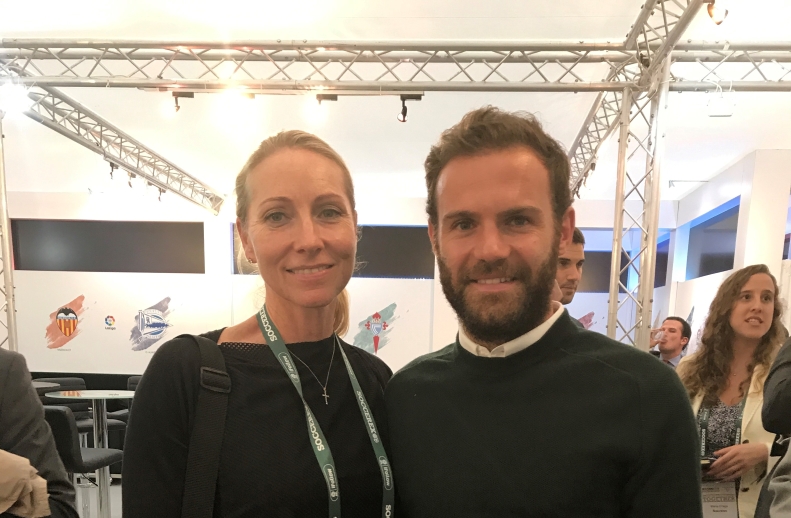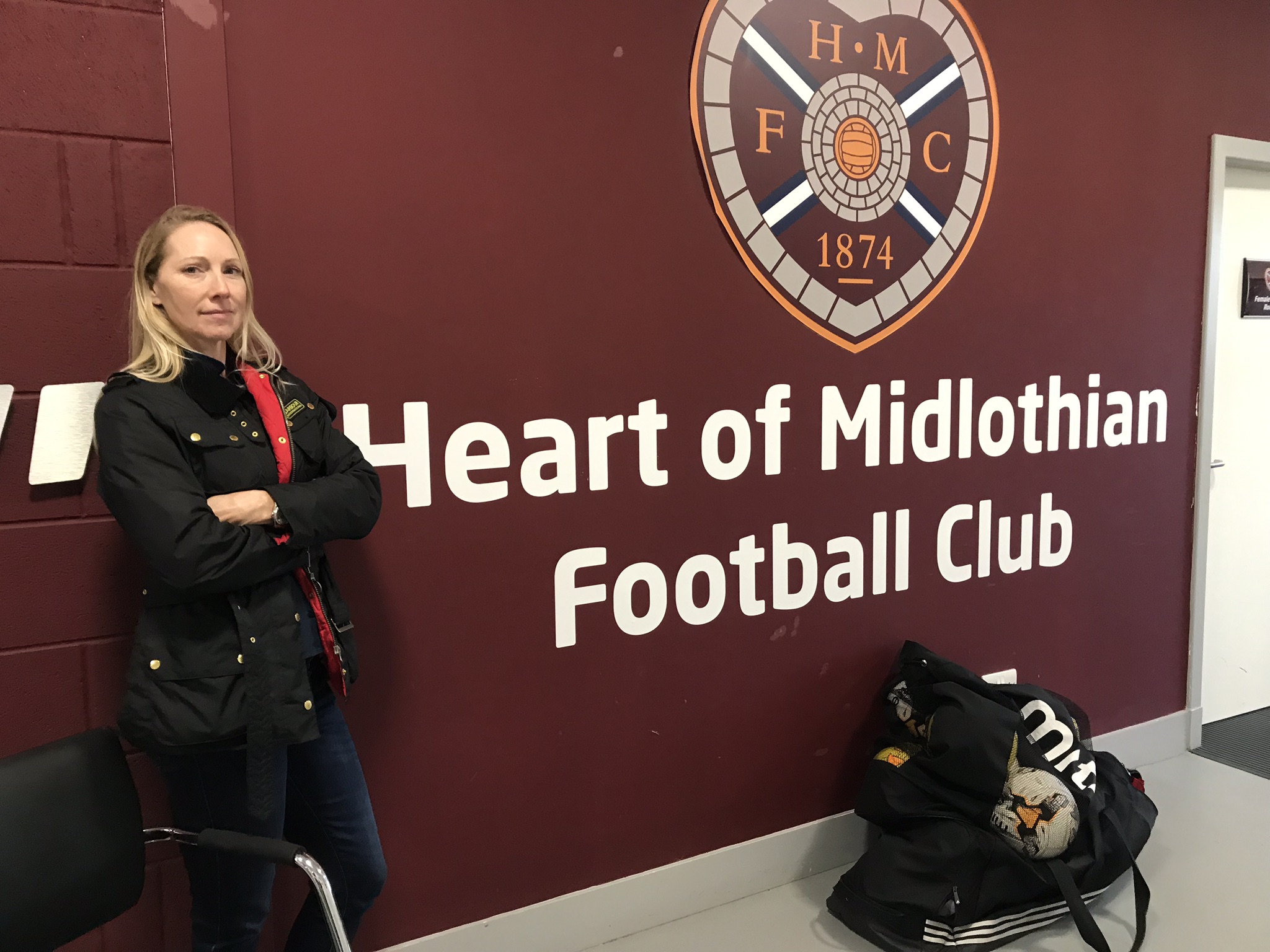First Female Agent Joins Common Goal
Stephanie Molina pledges 1% to become the latest agent to join the movement
For football agent Stephanie Molina joining Common Goal was one of the easiest decisions of her agency career.
The managing director of Asmantra Sports and Consulting has joined the movement – becoming the first female agent to do so – and is determined to help it grow.
Molina learned about the movement at its inception, has been following its growth ever since and, after being emotionally impacted by its power, felt the time was right to make the 1% pledge.
We caught up with her to find out a little more about the motivation behind joining, where she wants her 1% contribution to go, and how she has helped blaze a trail in an industry that has been male-dominated since its beginnings.

Why have you decided to join Common Goal?
I met Jürgen Griesbeck and Juan Mata in 2017 at a Soccerex conference when Common Goal was just starting. I had the chance to speak with Jürgen at length and was really touched by his personal story and specifically his time in Colombia. I was relatively new to football then and still learning about the diversity of its global presence. I was really impressed by the strength of his vision and the unwavering commitment he had inspired in Juan. I continued to follow the movement’s explosive growth and the tremendous impact that it has had on the industry over the years since.
My decision to join Common Goal was perhaps the easiest one of my entire agency career. When you feel emotionally inspired by something, you want to connect with it, you want to be a part of it, and it to be a part of you. It felt like joining something strong and beautiful. That’s what the Common Goal community is. I feel as an agent and an entrepreneur that I have a responsibility to use my network of players, coaches, clubs, and people of influence to help raise awareness, generate commitments and drive positive social changes where possible.
What social issue is most important to you and do you want your 1% to go towards?
I would like my 1% to go towards better water sanitation and menstrual hygiene education. I feel very strongly about children’s rights, education, and mental health. I worked many years in Africa and saw first- hand how children suffer from graft and corruption, a lack of social justice, equal rights, and lack of funds for basic needs. I knew many families who had lost children to malaria, because they couldn’t afford mosquito nets or oxygen bottles for premature babies. Young girls are particularly vulnerable to teenage pregnancy due to a lack of sex education. Across Africa, a greater importance and focus needs to be placed on the healthy and wholesome development of young women.
Football agents don’t always have the best reputation and are often portrayed in the media as only caring about money. How do you feel about this? Is it an unfair portrayal?
Sadly, I would say to a large extent, this is true. This industry is massive and fiercely competitive. The agency side can be dog-eat-dog and unfortunately, there is too often an overriding sense of scarcity, i.e. money is so hard to come by.
I don’t think it’s completely unfair to say there is a focus on money, but one must understand the reasons why. We do a large amount of work for players on a regular basis which they are often completely unaware of. Most people are also not aware of all the costs which agents incur in travel, players’ courses, and extra-coaching. The list is long and the time commitment is huge.
The fact that it’s so difficult to actually conclude deals and that these deals can fall apart at any moment, puts a lot of pressure on agents. The vast majority of agents really struggle to maintain a stable revenue stream to cover their costs and operate profitably. Simply put: it’s an incredibly tough job.
Is this portrayal something you think will change and are there a new generation of agents who believe in helping drive positive social change?
It’s not easy to generalize, because there are so many different kinds of agents with their own way of working, philosophy, and moral compass. Fortunately, information about today’s relevant issues, who’s doing what, where and how agents can get involved, is extremely visible thanks to social media, on-line courses, webinars, virtual conferences, etc.
The level of awareness among agents with respect to possible opportunities to drive positive social change has probably never been so high. I believe and hope that will see more collaboration and less competition among agents. Common Goal is a perfect platform for this, and I’m in active talks with other agents about creating partnerships to multiply our impact within the movement.

What role do you think agents can play in promoting football as a tool for good in the world?
Agents can have a leading role. We have the advantage of working across all areas of the industry (players/clubs/associations/institutions/sponsors). We have a balcony view and can therefore be instrumental in the influence they can create. Players are huge ambassadors, and agents are in the driving seat to educate, motivate, and move them to take positive action.
What would you say to other agents who might be thinking of joining the movement?
I would tell them to come help build something strong and beautiful! I would tell them that their decision would be respected by players and clubs. I would tell them that their contribution would multiply, and they would be making a real difference. I would ask them what might be holding them back from joining.
Common Goal has players, managers, executives, clubs, agents, fans, all together as part of a collective. How important do you think it is that the industry as a whole gets behind the movement?
Any movement needs a unanimous, consistent, and clear message, constantly repeated over time to be successful. The diverse members of Common Goal form a perfect circle with this singular message. It’s paramount that the industry as a whole gets behind the movement, because it demonstrates that there is no bias, no exclusion, and that no one is too big or too small to participate in the movement.
Of course, it helps that high-profile members promote the movement, because they reach a bigger audience, and this inspires more people to join. But in the end, we are all equal within the Common Goal community.
What advice would you give to players who want to use their platforms for social change?
I would greatly encourage them to do so and let them know the myriad of benefits which they can generate. I would suggest they use their platforms responsibly and in a meaningful way, to inspire others, show their value, and raise their profile. They should know that there are professionals who can help them get this right. Common Goal is an ideal platform to do just this, while also giving them more visibility.
As a female agent, what has been your experience in a predominantly male world?
I spent 15 years as a commodities trader, which is somewhat of a male-dominated industry, but nothing compared to football. It was difficult to earn credibility or even respect in the beginning. I was often asked ‘Why are you in this industry? Why should we work with you?’ I fought hard to learn as much as I could and always tried to be excellent in what I promised to deliver. I think it’s fair to say that I had to better than a male agent to get the attention of most clubs.
It’s somewhat understandable, since most agents are former players or coaches. I was neither, so there was always a bit of reticence by the clubs in the beginning, along the lines of: ‘What is she doing here?’ I felt I always had to prove myself, over and over again. But now, I would say that’s a thing of the past.
Players and clubs just want good professionals who can consistently deliver quality and improve them. This is my focus. We need more women in this industry and more female agents. We bring good emotional intelligence and have a strong endurance for hard work.